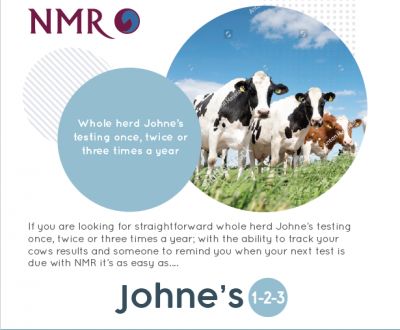
Posted By:
As the farming season progresses, we find ourselves busy with an essential task – Johnes reviews. At Shepton Vets, we take pride in witnessing the remarkable progress made by many of our farms, with the average numbers of red and amber cows across the practice now reduced to less than 5%. The National Johnes Management Plan, in collaboration with Red Tractor, has been pivotal in driving this positive change. Now, all RT dairy farms require an annual review with their vet, including declaration signing. Recent legal cases have reinforced the importance of this declaration, as it ensures a well-rounded management program tailored to each farm's unique needs, ultimately leading to improved herd health and productivity.
Recent research by Karen Bond at NML explored how Johnes disease affects the economics of a herd. The findings revealed that herds with the lowest Johnes prevalence experience reduced herd somatic cell counts (SCC), resulting in improved milk quality. Milk production per cow per year significantly increased in the best 50% of herds, while it decreased in the worst 25% of herds. Additionally, age at first calving decreased in the best 50% of herds, whereas the calving interval significantly increased in the worst affected 25% of herds. These figures clearly indicate the direct correlation between Johnes management and overall herd productivity.
Karen Bond's research also highlighted the importance of environmental management, as 40% of Johnes infections were found to be picked up from the surroundings of neonates. This emphasizes the critical role of segregation and cleanliness in the calving yard. To prevent any risk, it is essential to ensure that NO red or amber cows enter communal calving spaces at any time.
Over the last couple of years, we have embraced more advanced data measures, particularly the Johnes Progress Tracker available on NML/Herd Companion and CIS. These tools have been invaluable in measuring outcomes on farms by utilizing the Average Test Value (ATV). This indicator provides a true reflection of disease numbers and severity on the farm, less susceptible to fluctuations depending on cull numbers. The Progress Tracker also breaks down the types of cows testing positive, allowing us to identify specific drivers of disease on each farm and take targeted actions to optimize herd health.
Our team of qualified Johnes advisors, including Alex, Anna Hares, Lottie, Charlie, Bibby, Rosie, Rob, and Emily, are here to provide expert advice and support during your annual review. Together, we can devise a customized management program aimed at improving your farm's performance, well-being, and overall sustainability.
At Shepton Vets, we believe that proactive Johnes management is a key component of successful dairy herd management. Our mission is to empower dairy farmers with the tools, insights, and veterinary support needed to enhance herd health and productivity. As we continue to see promising results across our farms, we look forward to assisting more farmers in the UK and the Southwest region with their Johnes reviews and ensuring a prosperous future for their herds. Get in touch with Sam in our office to book your annual review and take the next step towards optimizing your herd's potential.
Whilst on my visits I have been having several discussions...
As our feline friends get older there are a few conditions...
Another winter discussion group season is now behind...
©2024 Shepton Veterinary Group Ltd., All rights reserved.
Privacy Policy • Terms & Conditions • Cookie Policy